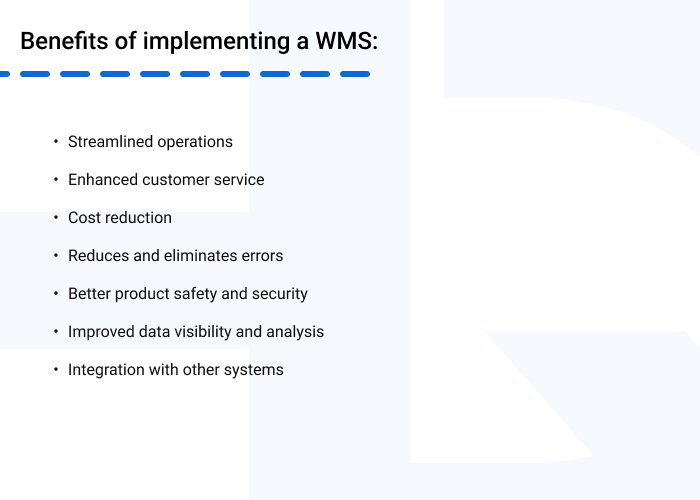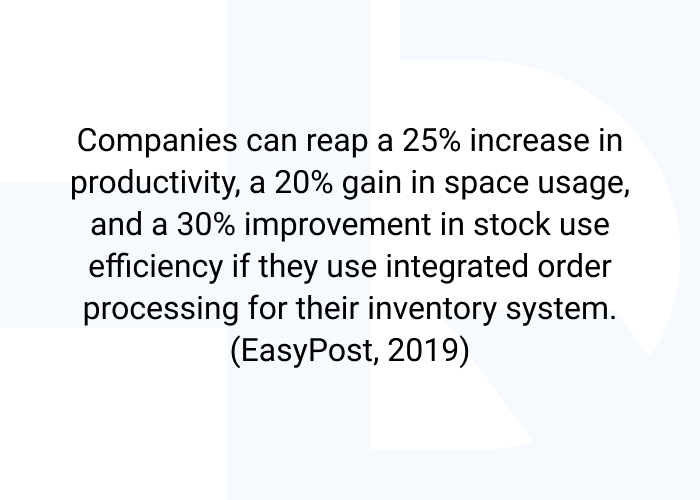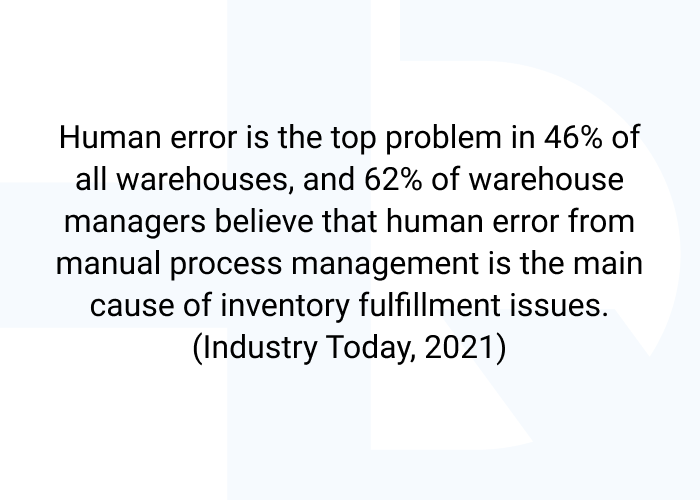Table of contents:
What is a WMS and Why is it Important?
Better Product Safety and Security
Improved Data Visibility and Analysis
Implementing or redesigning a warehouse management system (WMS) offers substantial advantages such as better productivity, accuracy, inventory control, customer service, and traceability, and a higher return on investment.
HQSoftware, as leading WMS developer, focus on creating custom WMS solutions that provide you with a scalable system architecture, built-in automation and comprehensive management features. This may give your warehouse a competitive advantage by enhancing operational effectiveness in a fast-paced industry. In this blog post, we will look at a few key WMS benefits that you should be aware of.
What is a WMS and Why is it Important?
Better Product Safety and Security
Improved Data Visibility and Analysis
A warehouse management system is software that helps coordinate warehouse operations from the time products enter the facility until they are removed. With a WMS, you can easily monitor inventory levels, regulate incoming and outgoing orders, and improve the warehouse layout. By analyzing past patterns and behavior, predictive analytics can help you make better decisions about staffing, scheduling, and inventory management.
The main advantage of a warehouse management system is that it establishes a paperless environment that assists in achieving the most efficient product selection, positioning, and shipment. Adopting a WMS in your warehouse operations will provide you with the following benefits.

A warehouse management system has the advantage of streamlining several processes. WMS solutions provide visibility in your entire inventory and help manage supply chain operations from the distribution center to the store. The breadth of software functionality can vary greatly, from basic tools that allow you to quickly complete, pack and ship goods, to complex programs that coordinate the work of large warehouses and optimize logistics.
The most important benefits of good inventory management are inventory-level tracking, automatic data collection, and reporting. Predictive analytics can forecast inventory needs and reduce the possibility of running out of stock. It is possible to scan goods at a variety of points: upon receipt, storage, assembly, packaging, and dispatch.
WMS adjusts stock levels in real time to minimize waste and avoid shortages. It is also critical to analyze inventory turnover rates, lead times, and demand trends, to ensure effective inventory control.
Another benefit of a warehouse management system is that it uses real-time monitoring and tracking. A WMS documents standard operating procedures to help you find inefficiencies and places where making adjustments can improve operations.
You can track inventory, location, shipments, and staff, monitor equipment, and follow status history by using batch numbers. Radio frequency identification (RFID), barcode scanning, and automatic identification and data capture (AIDC) devices are among the technologies used alongside a WMS for real-time tracking.
WMS benefits the order completion system by reducing the need for manual handling. The software can automate processes such as receiving, storing, picking, and shipping. This decreases the possibility of human error and delay. Worker injuries and strain connected with manual handling can be reduced by using a WMS, resulting in a safer and healthier work environment. WMS solutions provide instant access to inventory levels and order positions, enabling you to prioritize orders.

For instance, for the project “E-3PL System Development” developed by HQSoftware, the E-3PL platform helped ensure a 99.9% order accuracy rate, an 80% increase in AOV (average order value), and 99.4% of orders shipped the same day.
Warehouse management software automates inventory processes such as receiving bulk orders and automatically building the appropriate picking list. Such a system can also print storage labels and item labels, track and handle returns, do inventory analysis, and perform other functions.
WMS assigns individual tasks to specific workers and tracks them to improve productivity and reduce downtime. With WMS, you can provide training and onboarding instructions that equip workers with the necessary skills and knowledge to boost production.
Implementation of a WMS makes it possible to create a warehouse chart that will allocate inventory storage using available space when entering warehouse size information (for example, pallet size, object size, product usage).
The software can develop daily plans that determine the required workforce and estimated costs by calculating current orders and available personnel. The program can connect to the transport company’s software to schedule delivery, locations and receipt time.
The benefits of a WMS include precise, immediate reporting that can help identify and correct operational inefficiencies. This allows you to more effectively estimate requests, maintain inventory levels, and plan production while decreasing errors.
One of the most important advantages of a warehouse management system is fast order fulfillment. WMS facilitates on-time delivery by enabling 24/7 monitoring of inventory and order processing, resulting in increased customer satisfaction.
Accurate order fulfillment is a crucial aspect of warehouse management systems. It involves efficiently and accurately processing customer orders, ensuring that the right products are picked, packed, and shipped in a timely manner. A picking list provides all of the relevant information, including shipping data, route, location, item parameters, and any other aspect of order preparation.
A WMS automates delivery and shipping operations, guaranteeing that products are delivered to their owners. When an order is received, the WMS generates a pick list that directs workers to the precise location of the relevant products. This speeds up order fulfillment and boosts productivity.
Customer service departments and warehouses can track orders, shipping procedures, feedback, and lead times through a single system in real time. This automatically reduces the number of errors and time lost.
Want to create a WMS solution for your business? We’re ready to help!HQSoftware has a team of skilled professionals ready to tackle the project. Let’s talk!
Anna Halias
Business Development Manager
WMS adoption also has advantages in terms of reducing overhead. By cutting operational expenses and enhancing your supply chain processes, you’ll boost your bottom line.
Warehouse management systems can contribute to reducing labor costs through various means:
Implementing a warehouse management system can help lower your inventory costs through improved inventory management practices and increased operational efficiency. Better organization of space, inventory storage and workforce management will reduce waste and logistics costs.
A WMS can help cut transportation costs. You may cut the amount of work, time, and documents required to ship your items by installing a WMS. You may also optimize your load forecasts to reduce the number of vehicles required to deliver your merchandise. This can result in significant fuel savings and improved planning.
The system displays inventory levels in real time, allowing you to follow the shipment of goods and ensure sufficient stock to fulfill orders. This eliminates back orders while also lowering the danger of overstocking and surplus inventory.
A WMS redesign or implementation ensures a quick and quantitative return on investment. It reduces labor and time requirements while improving accuracy, productivity, customer happiness, and inventory management.
One of the WMS benefits is avoiding human error. With a WMS, barcodes or RFID scans can replace manual data entry, reducing mistakes and ensuring accurate pick and put-away operations.
The WMS can report function defects and handle inventory concerns. You can check inventory levels, track order processing, and detect possible difficulties before they become problems. This enables you to take quicker and more efficient corrective actions, minimizing the likelihood of errors.

You may update inventory levels in real-time as goods are received, stored, and shipped. This eliminates the need for manual inventory checks, reducing the chance of mistakes involving human error or delays in processing.
An improved WMS benefits the business by guaranteeing that products are handled and stored correctly to prevent damage or contamination.
Sufficient labeling and signage in the warehouse ensures product safety by identifying hazardous goods and providing instructions for handling them.These can accommodate various types of products and minimize the risk of damage or collapse.
A WMS that includes security features such as ID scanning, CCTV monitoring, and secure access controls can help prevent theft, unauthorized access, and product tampering. These features can be further enhanced with RFID tagging and real-time GPS tracking.
WMS advantages include close monitoring of supply chain metrics. With the help of the system, you get a more complete view of your inventory levels, order rates, and shipping and delivery details.
WMS solutions offer analytical tools that help you gain insight into the supply chain process, optimize up-selling and cross-selling opportunities, improve warehouse layout and flow, and ensure accuracy of inventory and orders. The system helps identify your strengths and weaknesses and equips you to apply a data-driven approach to optimizing your operations and growing your bottom line.
With improved reporting, you get easy access to accurate and up-to-date information about your inventory, order status, and other metrics, which can help you make better decisions.
Integrating a WMS and Enterprise Resource Planning (ERP) systems allows for real-time data interchange between the two, enabling the smooth flow of crucial data, such as inventory levels, orders, and shipping details. ERP systems aid in managing inventories, staff, finances, and customer relationships.
Integrating a Transport Management System (TMS) helps improve order processing efficiency by optimizing the entire supply chain process. The combination of these two technologies allows you to plan, execute, and optimize shipments while also managing warehouse operations. It is critical for organizations involved in logistics and transportation operations.
Implementing a WMS is a big decision, but it can be a very rewarding one. If you’re considering customizing a warehouse system for your business, be sure to choose the right software development company.
At HQSoftware, we take an individualized approach, to provide the finest possible solution for each business, boosting the final product’s marketability and distinctive value. To launch your product with a competitive edge, we will evaluate the original strategy, specialized domain, project goals, and target audience specifics when building WMS software.
A well-run warehouse is a critical part of any successful business, and a WMS can help you achieve that goal. Here are some of the key advantages of implementing a warehouse management system:
Read more about HQSoftware’s warehouse management system services, or contact us to learn more about what we can do for you!

Head of Production
To ensure the outstanding quality of HQSoftware’s solutions and services, I took the position of Head of Production and manager of the Quality Assurance department. Turn to me with any questions regarding our tech expertise.
We are open to seeing your business needs and determining the best solution. Complete this form, and receive a free personalized proposal from your dedicated manager.

Sergei Vardomatski
Founder